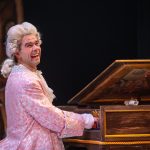Andreas Delfs returns to open the fall MSO season
Guest pianist Jeremy Denk will also join for Liszt's first piano concerto, but the program's centerpiece is a performance of Tchaikovsky's Fourth Symphony.

Andreas Delfs, the MSO’s conductor laureate, returns to open the company’s season with Tchaikovsky’s Fourth Symphony.
The Milwaukee Symphony Orchestra returns to the Marcus Center this Friday, but they aren’t the only ones making a reappearance. Conductor laureate Andreas Delfs, last seen with the MSO at their New Year’s Eve Pops concert, will join the company in a triumphant season opening built around Tchaikovsky’s Fourth Symphony.
Delfs served as the MSO’s music director for 13 years, until 2009. And he’s thrilled to return to Milwaukee with a piece as powerful and rewarding as this one.
“It’s one of those great symphonies that pull you right through a whole gamut of human emotions,” Delfs said. “It’s immensely satisfying — one of those uplifting experiences that remind you that life can be hard, but that solutions can be found and that a glorious, happy ending is always possible. It keeps you on that spiritual level for quite a while.”
“It’s the perfect way to start the season,” he added. “It’s really what music is all about.”
Tchaikovsky ultimately wrote seven completed symphonies – though he is as familiar, or more, for his operas and ballets, including Swan Lake and The Nutcracker – but Delfs said the Fourth was a turning point for the artist. Tchaikovsky composed the work in 1877, during a turbulent time in his life. His marriage was disintegrating after only a few months, and his first three symphonies had received poor recognition in his native country.

Tchaikovsky’s marriage to his wife, Antonia Miliukova, struggled from the very beginning, and ended a mere two and a half months after they were wed in July 1877, although they were never legally divorced.
“You must imagine that the turmoil he was going through could not stay out of his work,” Delfs said. “I don’t think he sat down to write a portrait of himself, but the torture he went through—the anguish that dominated his life—you can hear it in every note. There’s no doubt.”
With the support of his family and his patroness Nadezhda von Meck, Tchaikovsky found the inspiration to complete the work, which in time became the first success of his career.
“This is about a relatively young composer searching for his expression,” Delfs said.
Interestingly, the symphony is unevenly organized; its first movement lasts about 20 minutes, longer than the length of the last three movements combined. Delfs said this movement will present the most emotion throughout the performance.
“You could say, ‘Oh, let’s just get to the ending because that’s what the people love,’ but a mature performance will have that sub-context in the first movement,” Delfs said. “A skilled listener will really hear the quality of the orchestra and the depth of the music making.”
Delfs suggested that his audience “take a deep breath” after the first movement is over because its contents are much denser than in the last three.
“You really need to digest the first movement, and then it will be so much more rewarding to go through the next three movements,” Delfs said. “That’s why the ending is so uplifting. Tchaikovsky the composer as well as the orchestra and the audience go through labor to come out to this positive ending.”
Delfs has not conducted the MSO since his concert on New Year’s Eve, although he said it is his favorite orchestra to conduct.
“It’s not one of those orchestras that you have to pull every note out with a hook,” Delfs said. “They have so much to offer and all you have to do is accept what they have to offer. I feel like there’s lots of little rays of sunshine coming out of the orchestra and my job is to bundle them like an optical prism—I make it a razor sharp beam that is then unleashed unto the audience,” Delfs said.
Delfs’ goal: to make this performance feel like the first time his audience is hearing Tchaikovsky’s Fourth. It’s a challenge, the veteran conductor says, that requires him to connect with the piece emotionally, and dig into his own memories of anguish and turmoil. A struggle, but one that like the symphony’s booming, imperial finale, should be worth the effort.
The MSO will perform Tchaikovsky’s Fourth Symphony on a program that also includes Aaron Jay Kernis’ Musica Celestis and Liszt’s Piano Concerto No. 1, performed by guest pianist Jeremy Denk. Concerts begin at 8 p.m. Friday and Saturday, Sept. 20 and 21, and 2:30 p.m. Sunday, Sept 22, at the Marcus Center. Tickets are $25-$102 at the MSO website, the MSO ticket line (414-291-7605) and at the Marcus box office, 414-273-7206.
Hear the MSO musicians and local music experts engage in a personal discussion about the symphony an hour before the performance at Meet the Music in in Anello Atrium at the Marcus Center for the Performing Arts.





















Tchaikovsky wrote six complete symphonies, not seven.
Actually, that’s not technically accurate–he wrote six numbered symphonies, as well as an unfinished seventh, but also completed a seventh symphony titled the “Manfred Symphony,” between his Symphonies No. 4 and 5.